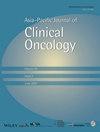Implementing a group-based online mental well-being program for women living with and beyond breast cancer – A mixed methods study
Abstract
Purpose
There is a gap in available mental well-being services in Australia for women diagnosed with breast cancer. This pilot mixed-methods uncontrolled study aimed to assess the feasibility of an online mental health and well-being intervention, the Be Well Plan (BWP), which enables participants to create a personalized, flexible well-being strategy.
Methods
Women diagnosed with stages I-IV breast cancer were recruited into 4 asynchronous groups to participate in the BWP, a 5-week facilitator-led group-based mental health and well-being program. Psychological measures used at baseline and post-intervention included: the Warwick Edinburgh Mental Well-Being Scale, Brief Resilience Scale, Self-compassion Scale, 9-item Patient Health Questionnaire, 7-item General Anxiety Disorder scale, and EORC QLQ-C30. Multivariate analysis of variance and effect sizes were calculated on pre- and post-psychological measures, followed by qualitative content analysis on post-completion interviews with participants.
Results
Nineteen women (mean age 45.7, standard deviation = 7.74) were included in the study. Large effect sizes were reported for mental well-being, depressive symptoms, and anxiety (partial ω2 = 0.28, 0.21, and 0.20, respectively). Self-compassion, resilience, and quality of life results were not statistically significant. Qualitative content analysis provided insight into experiences with Program Delivery Experience, Application of the BWP, Mental Health Improvements, Supporter Involvement, Adopted Interventions, and Recruitment. Participants reported benefits in mindfulness, grounding techniques, and physical activities.
Conclusion
The BWP has the potential to be an effective intervention to support the mental health and well-being of breast cancer survivors.
Implications for cancer survivors
This study highlights flexible interventions that accommodate the diverse needs of breast cancer survivors to improve mental well-being and alleviate psychological distress.



 求助内容:
求助内容: 应助结果提醒方式:
应助结果提醒方式:


